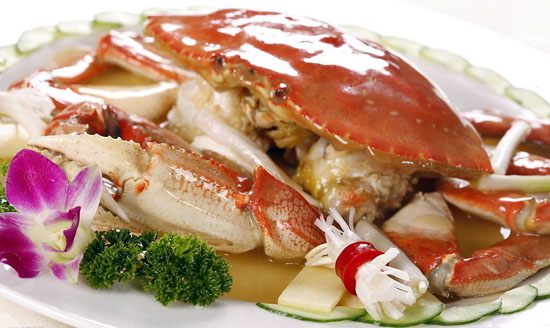Crab is a seasonal food – different regions have different harvesting months – but should you wish to eat, you can buy it in any seasons, fresh or frozen. Crabs are not only a tasty food to eat but also have certain health affects on the body.
Health Effects of Crabs
1) Clear the Intestines and help bowel movement
The ancient Chinese medicinal book Shen Nong Ben Cao Jing recorded that crabs are cold in nature and salty in flavour, acting on the Stomach channel. They help to clear stagnation, heat and toxins in the digestive system. They are suitable to eat when you are experiencing the following symptoms: dry stools, constipation, smelly wind, bloating, bad breath. In this case you can eat 1 or 2 crabs per week.

2) Help heal broken bones
Chinese medicine considers that after breaking bones, the muscles or channels around the break will have stagnation and this will mean a lack of circulation around the injured area. This will have an adverse affect on the healing of the broken bones. The stagnation will also cause pain. Therefore it is best to eat something to help clear the blood stagnation – crab is one of the foods that will do this.
Also, because of the salty nature of crabs, it is a food that is able to help the liver to remove blood stasis and stagnation, improving blood circulation and increasing the rate of healing.
After injury, or for those who frequently encounter exercise-induced injuries or those who are frequently impaired by tendon/ligament or bone injuries, eating 1 or 2 crabs twice a week can be beneficial.
2. Cooking Instructions
There are multiple ways to eat crabs – steamed, boiled or fried – but they are best consumed when cooked fresh with ginger and vinegar, to help reduce the cold nature of the crabs, and avoid diarrhoea.

![Diseases, Symptoms, tcm, [tcmwindow.com]](/uploadFile/adImg/2015/11/11/f5cbfcc0-4df5-4646-9b9a-f316651a0199.jpg)





